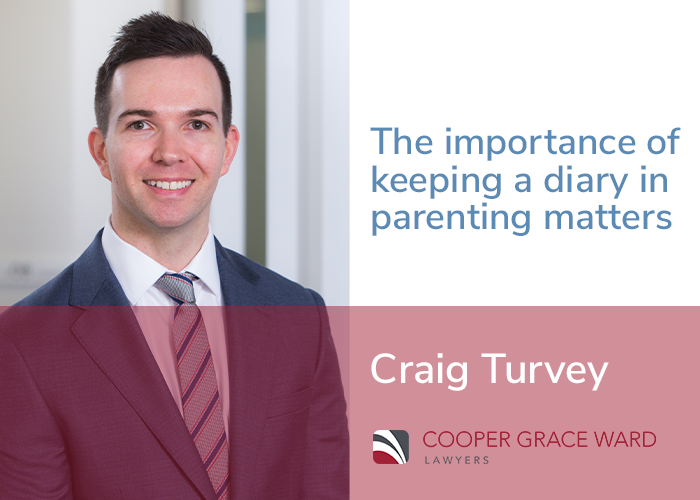In this video, CGW senior associate Craig Turvey talks to us about parenting matters and the importance of keeping a diary.
VIDEO TRANSCRIPT
Hi, my name is Craig Turvey and I’m a senior associate in the family law workgroup at Cooper Grace Ward.
I want to talk to you today about parenting matters and the importance of keeping a diary. Parents typically hope that if they separate, they’ll be able to amicably negotiate their parenting arrangements and it will all be quite quick and painless. Obviously, that’s the ideal world, but it doesn’t always happen that way. It can be a process that spans a number of months sometimes, or if there’s court proceedings, sometimes a couple of years, keeping in mind that it’s not like a property settlement where once you’ve signed off on it, it’s done and dusted – parenting arrangements can always change until children are 18 or over.
So, what that means is that sometimes there might be big gaps between when an incident has occurred, it might be an incident of family violence, it might be an issue of, someone might have an issue with alcoholism, there might be all sorts of other things that crop up that occur at the time and are fresh in your head at that point. But then as time goes by, you just forget the finer details of them and that can be important in family law world if you have to file an affidavit in court proceedings, and you need to rely on your memory and recollection of what happened for that specific incident.
What we recommend to people is that you keep a diary, whether it’s the old fashioned physical, paper diary, or whether it’s some sort of electronic form, it obviously doesn’t matter. The importance is keeping a specific record of exactly what happened, who behaves in a certain way and what occurred, at what time and on what date, so that if you need that information later on, you’ve got access to it.
It’s quite common for clients to send us information, which is very sort of general. For example, they’ll say, on this date, he raised his voice at me and I was scared. That doesn’t really tell you a lot. You want to know, what was his demeanour? Was his voice raised? What was he actually saying? What words did he use? What words did you use? Where were you standing? All those sorts of things are very important and it’s much more persuasive to a judge to have a very articulate and clear outline of what happened on a particular date and during an incident rather than some sort of vague assertion about people’s behaviour.
As painful as it can be sometimes to have to go through and write those things, it’s usually better to do it as it happens, (1) because it’s just fresher in your memory, but (2) also it means you don’t have to keep reliving it. The incident happens, you write it down and then you don’t have to worry about it, hopefully, again. You don’t need to produce it. But if you do, the evidence is there. So, in parenting matters, we really do encourage people to keep a diary of those things.
If you have any questions about parenting matters generally, or what evidence a Court might accept in a parenting matter, please don’t hesitate to contact me or one of the other family lawyers at Cooper Grace Ward.





